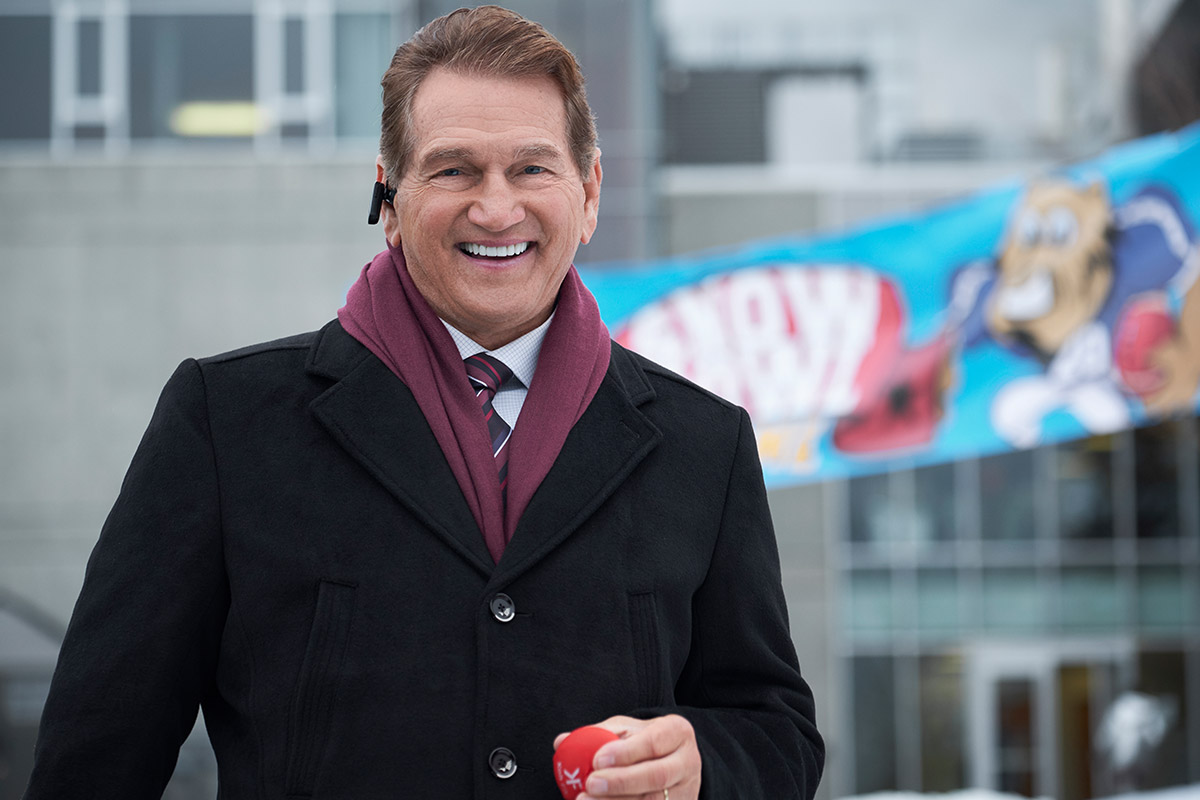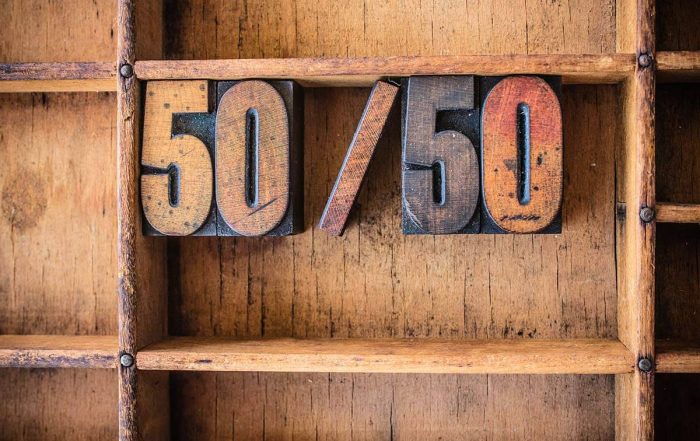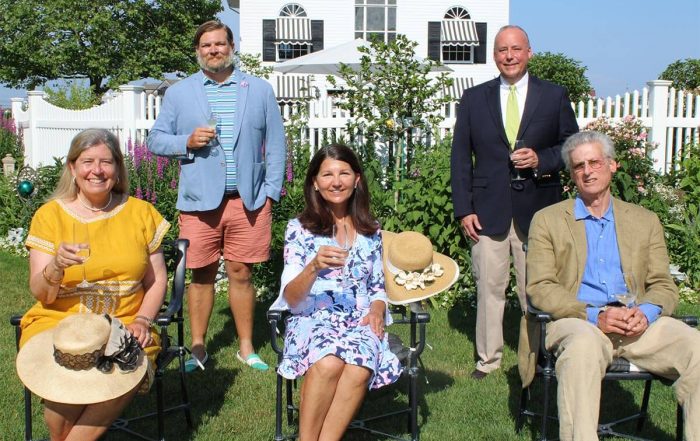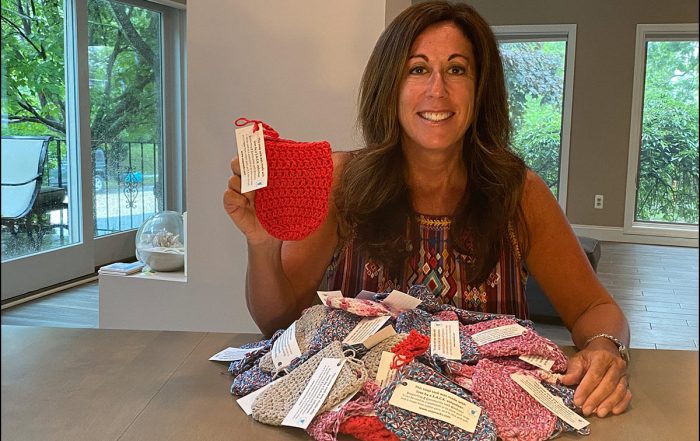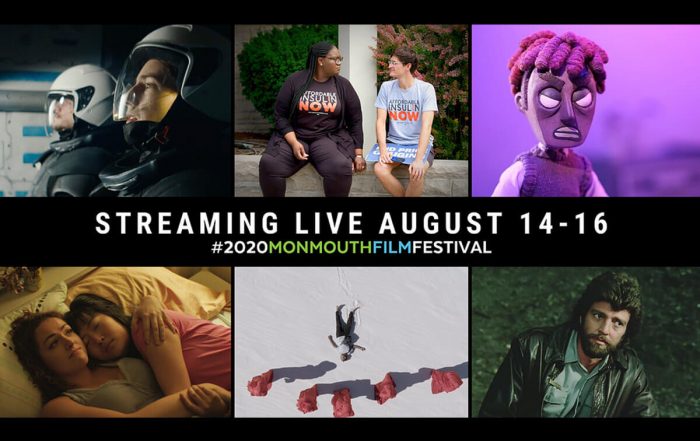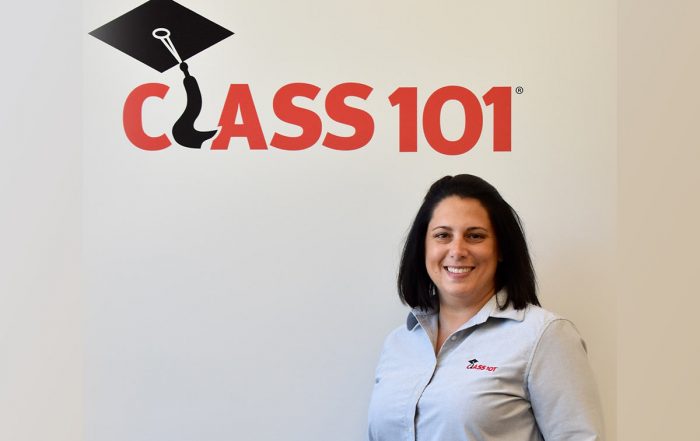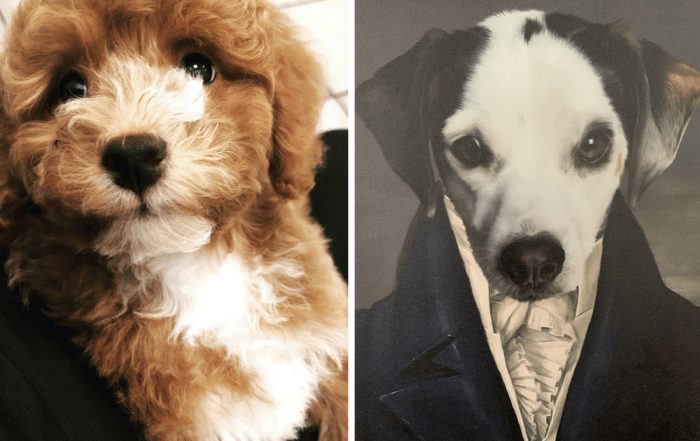FEATURED PHOTO: Joe Theismann | CREDIT: ©2018 Crown Media United States LLC/Photographer: Allister Foster
Whenever mentioning football legend Joe Theismann to people of a certain age, the same reaction is found, the person grimaces and recalls some version of the career-ending tackle Theismann suffered on November 18, 1985 from the hit of New York Giants linebacker, Lawrence Taylor.
Taylor sacked then quarterback Theismann from behind during the second quarter of a televised Monday Night Football game. It wasn’t until the reverse angle of the play was shown that it became clear why Theismann didn’t get up after the sack and why Taylor frantically signaled to the sideline for help. The blow caused a gruesome break of Theismann’s right leg between the knee and ankle with the bone being visible on television.
The incident has gone on to be more than just a career-ending sports injury. In 2014, ESPN named the play the Number Two Moment in Monday Night Football history, behind only the Fail Mary. In 2004, when ESPN commemorated the 25th anniversary of the company’s founding with a list of the 100 most memorable moments of the era, Theismann’s injury ranked number 75. To further cement the day in pop culture, the movie The Blind Side used the play as a jumping-off point to explain the importance of protecting the quarterback.
A collective memory for football fans, movie-goers, and the world of sports, but for Theismann it was a turning point. A moment in time that forever changed the direction his life would take, and the man he would become. A co-star in Hallmark Channel’s SnowComing as part of their Winterfest movies, we were able to catch up with Theismann for an interview. In speaking with him it’s easy to see why he was nicknamed Captain Bubbly during his award-winning career as a Washington Redskins’ quarterback. Both entertaining and enlightening, his years of knowledge about life and people make him at once engaging about life on and off the field. Here’s our exclusive interview with #7, Joe Theismann, who began his career as a Washington Redskin 45 years ago this month on March 1, 1974.
CM: How do you feel football has changed since you played?
Theismann: The game has become a lot more wide open. It’s 65% throw now, as opposed to when I played it was closer to 45 throw 50 run. The rules are certainly different. They protect the quarterbacks like they’re babes in arms.
CM: You weren’t protected that way…
Theismann: Oh man, I’ve had my teeth knocked out, I’ve had multiple concussions, broken my right hand twice, dislocated my left elbow, broke my right leg twice, broke my left collar bone, couple of ribs on my right side, I’ve had all foot issues, turf toe. I’ve had all kinds of different things. And if somebody asked me if I’d go back and play, I’d go back tomorrow and play again. I love the game. I love to compete. I’m a competition junkie.
CM: Let’s talk about your football career a little bit. How did you first get involved in the sport?
Theismann: My Pop Warner coaches wanted me to get involved when I was 10, but my mom wouldn’t let me play until I was 12. Finally, I had a buddy of mine come to the house dressed in uniform so she could see what it looked like and she consented. So I started playing football for the Little Knights of South River, New Jersey.
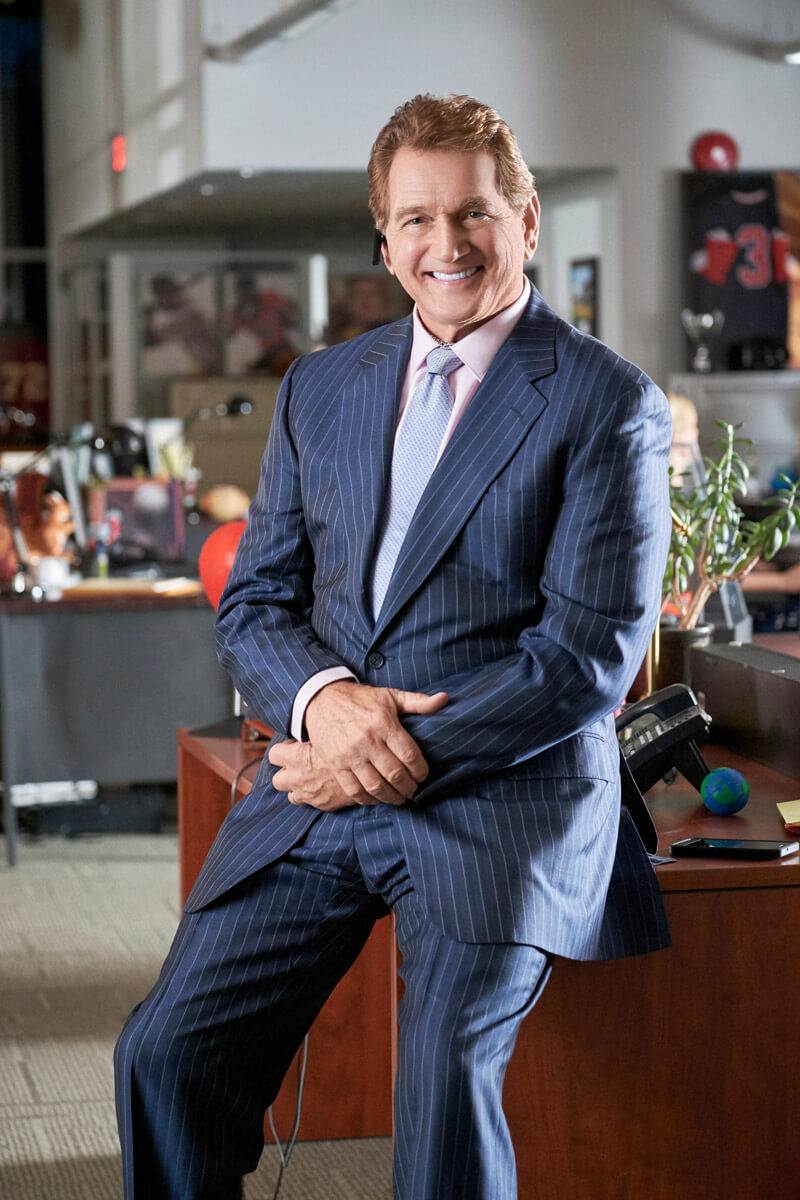
CREDIT: ©2018 Crown Media United States LLC/Photographer: Allister Foster
CM: You were an all-around athlete playing baseball, basketball, and football, when did football become your passion?
Theismann: Actually baseball was always my passion. I started that at the age of 9. Baseball was always my passion; football was something I enjoyed doing. I lived two blocks from my high school and we used to walk to the high school…and if my mom ever wondered where I was for dinner or something, it was simple all she had to do was walk a couple blocks and yell at me and I’d be home. I’d be up at one of the fields, either the tennis court, or the basketball court, or on the field, or playing stickball against the wall. Any number of those things, that’s where I’d be.
CM: Was Joe Namath your sports hero?
Theismann: Yea, he was my hero. Joe Namath was always an idol of mine. I emulated him. I walked around with my shoulders hunched over, I had the same kind of shoes he had, I went and bought a white rug, a shower mat, and that became my llama skin rug in my bedroom when Joe had that. Oh yea, when he broke his jaw I changed my face mask to be like his. He’s a dear friend today, which is really great. He had sort of been a model for me. Joe has always been so gracious, I’ve observed him being gracious to people and been around him. And no matter what aspects of life you move into, that’s one of the most important things – no one is ever more important than anyone else, and I think you have to treat everybody with respect. It gets a little overwhelming at times, but I think it’s harder to be a stinker, I use another word, but we’ll say stinker. I think it’s harder to be a stinker than it is to be nice. When people come up to you and say hello, you say hello, I mean it’s not that hard. I close my presentations with another little quote, “it’s nice to be important but it’s a lot more important to be nice.” There was a time when I got full of myself. I was an MVP of the League, I was a World Champion quarterback, I was doing well financially and I thought I was the cat’s meow. It was all about me. And once my leg got broken that all changed. I got a real perspective on life.
CM: How did you transition through your career-ending injury? How did you survive that?
Theismann: It wasn’t easy. I had a chance to take a step back and look at myself and see who I was, what I was becoming, the way I looked at life, and I decided I didn’t want to be that. I didn’t want to be the guy who was all consumed with himself. I wanted to be somebody who could affect other people. I want to be able to affect people in a positive way. That’s why I love doing the presentations I do. I love to be able to give people somewhat of a foundation, a game plan, for how to live life. I take my life, the good and the bad, and I say this is how I’ve lived my life and take what you want from it but maybe it will affect yours in a positive way.
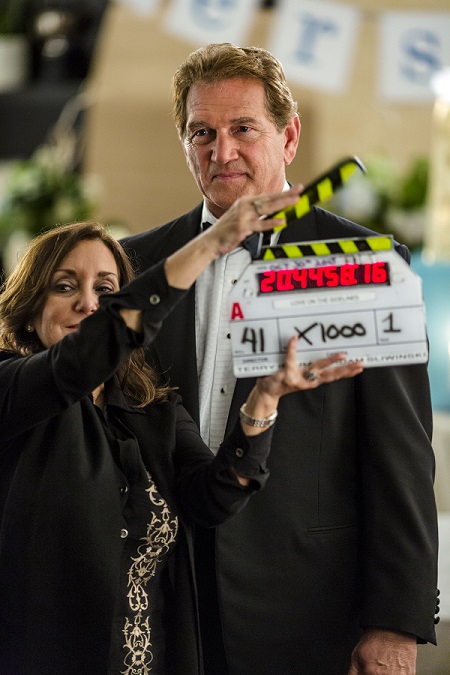
CREDIT: Copyright 2015 Crown Media United States, LLC/Photographer: Eike Schroter
CM: How did you become a motivational speaker?
Theismann: I started doing it in earnest in 1983 after we won the World Championship in 1982. I started getting invited to different functions, and I noticed so much of the conversation with executives, with sales people, with HR, with marketing, every different element in life, the conversations were the same as we had in football. People talk about goals. I built the presentation so the world of sports, the world of business, and our own lives all parallel one another. All those things I learned in the world of sport and I try to tell stories, because we really are story tellers.
CM: So in 1983 you started with motivational speaking and in 1985 you retired from football. Did you know then you wanted to go into the world of broadcasting and acting?
Theismann: I actually worked in television in Washington D.C. I did Good Morning Washington. I took two classes in college, speech and argumentation, that served me very well and still do to this day. Just learning how to get up in front of people. Public speaking is perhaps the number one fear of individuals. I made my living doing it for so many years. I’ve been blessed to have different careers, whether it was professional football, or broadcasting, speaking, or now acting to a degree, so I’ve had a chance to dabble in a lot of areas.
I had a guy ask me the other day, he said he has friends who had success early in their lives and now they walk around like empty shells, ghosts. He wanted to know how I escaped that. What I did was look at life like this, football was the axle of my wheel; that’s where I made my income, that’s where I put a ton of my energy, but then I also believe that you have to have some type of diversions from that to really expand as a person. So I got into acting in the 80s. Then I did motivational speaking in the 80s. Then I invested in real estate, then in different businesses, and I learned about different businesses. And so if something happened to the axle, I had different spokes to be able to rely on. So many people focus on one thing and one thing only. It’s the same thing as a portfolio when it comes to finances, you need to diversify. So when I was having this conversation I asked him, what do your friends like? What is their passion beyond the one thing that they did? I find it hard to believe that an individual would have one, singular passion.
CM: Where did you get that knowledge from? As you say, most people stick to the one thing they’re really good at.
Theismann: A little bit of it came from Coach Gibbs. (Joe Jackson Gibbs 20th and 26th head coach in the history of the Washington Redskins.) When I got Coach Gibbs as my head coach in Washington he was 100% focused on football. And then he got into NASCAR. And I talked to some guys who had Joe as a coach after I got out of the game and he had gotten into NASCAR. Not that he didn’t totally love it and commit to football, but it was a little bit of a diversion mentally for him and they said he was a different person to deal with. They felt he was more approachable, easier to spend time with. And it made sense to me. You can get so focused that you really can’t see the forest for the trees. You get so consumed with what you have going on, you really don’t know what else is going on around you. We went to two World Championships when I had a chance to play for him, and he won two after that. So his record, he’s in the Hall of Fame, and he certainly deserves to be there. Every day we get a chance to learn something, and if you really want to learn something, you can. There are opportunities out there, and opportunity is my favorite word. When you’ve stopped learning, then basically you’ve stopped living.
CM: What has been the most challenging aspect of your career?
Theismann: I think when I got hurt one of the most challenging aspects of my career was mentally not feeling sorry for myself. I did for a while. You don’t get hurt and say, okay, life’s a bowl of cherries and I’m going to start picking them out. I went through a little bit of depression, figuring out what I was going to do. One of the hardest things I had to deal with was asking my self why. You ask yourself, ‘why did this happen?’ I had just signed a brand-new five-year contract, and then all of sudden I was hurt and I couldn’t fulfill the obligation I had. I was looking forward to it, but I couldn’t.
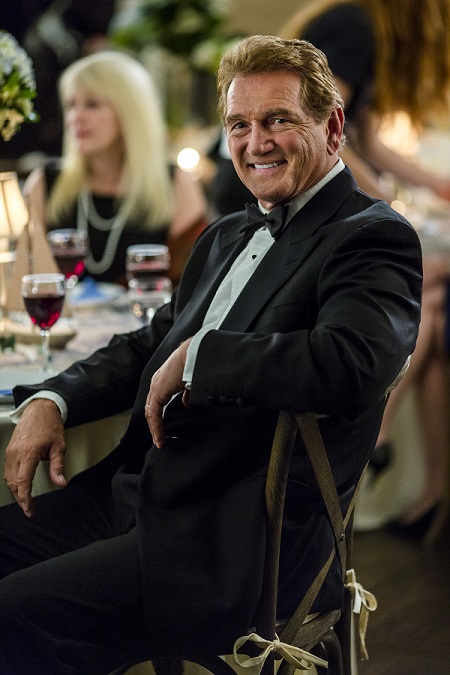
CREDIT: Copyright 2015 Crown Media United States, LLC/Photographer: Eike Schroter
CM: You were inducted into the New Jersey Hall of Fame. Do you still consider yourself a Jersey guy?
Theismann: I’m a Jersey guy all the way. Through and through I’m a Jersey guy. My wife is a Memphis girl and we live in Memphis, TN and we’re in Virginia too, but I’ll never not be a Jersey guy. It was a great honor to be inducted into the Hall of Fame. When you’re recognized where you grew up, it represents so many different parts of your life as a youth. It represents your neighborhood, the guys I grew up with. Those are the very influential parts of your life. Those are the years that really emblazon in your mind what you want to be, or who you might want to become. I went in with Joe Namath and then Queen Latifah, she went in that year too. She is such a versatile actor.
CM: Where did you hang out in Jersey?
Theismann: Now my sister lives in Freehold. But then, as kids? Silver Beach, we used to go down to Seaside. My first major injury was there. I dislocated my shoulder at Long Beach Island. This is a funny one. It was after my sophomore year in high school, we had a really good year, and we go down to the beach. So I hurt my shoulder and I call my dad and say, ‘Dad I just want to let you know I hurt my shoulder.’ and my father says, “Which one?” So I say, ‘My left.’ And he says, “Okay, here’s your mother.” He wanted to make sure I didn’t hurt my right one. Don’t hurt the money maker.
CM: What is your number one tip to a young person about life?
Theismann: Have dreams. And don’t let anybody dissuade you from your dreams. Don’t let anybody tell you that you can’t be, or become, everything you want to be. I came out of high school I was 5’10’’ and 152 pounds. I entered the University of Notre Dame at 5’10’’ and 158 pounds. I was one of 13 quarterbacks, a skinny little kid, and I wrote down on a piece of paper the day I got to college, ‘I will be the greatest quarterback ever to play at Notre Dame.’ Now whether I was, or whether I was not, is insignificant to the fact that my dream was put out into the universe. I tell people to write down their goals in four specific areas: professional, personal, spiritual, and financial. What do you want? Bring it out into the universe. The universe is out there to help us to accomplish the things we want. Too often people get caught in indecision, do I want to do this, do I want to do that, or they never even take the time to write their dreams down so there’s no reference point. You can sit around all day and say, well I think I’m going to do this today, I think I’m going to do that today – I procrastinate like everybody else. But every once in a while, I have to sit down at my desk and say, ‘Enough. I have to clean up the clutter.’ And that’s basically what you want to do, clean up the clutter.
CM: What comes next for Joe Theismann?
Theismann: Well we have grandchildren. Watching them grow up, spending time with them. My wife and I have a place in Florida to take a little time to reload. We’ve done some remodeling, we’re doing some traveling. And the thing I want to try to do is give back more. I have a website, (joetheismann.com) and on my website I’ve asked people to make a donation to St. Jude if they want me to sign something. All I want to do is try to raise money for the kids. We also live in Memphis where St. Jude is based, and to me it’s unbelievable that no families pay for housing, treatments, anything. The Wounded Warriors is something else I try to support as much as I can.
Recommended for you
Kids with Cancer Need Help… Here’s What You Can Do
The daily burdens thrust upon families who are battling pediatric cancer are [...]
Monmouth County Historical Association Virtually Celebrates Annual Garden Party
FEATURED PHOTO: MCHA Executive Committee: (l to r front row) Kathy Jones (2nd [...]
Meet Your Neighbor: Stacy Wiener
FEATURED PHOTO: This is where caption text will go for featured photo. As [...]
Monmouth Film Festival Redefines the Festival Experience this August
As film and theater folk like to say, the show MUST go on, [...]
Meet Your Neighbor: Laura Ciccone, Educational Advisor
FEATURED PHOTO CREDIT: Cathy Padilla Laura Ciccone lives in Lincroft with her [...]
Pet Celebs: August 2020
Your pets can be celebrities too. Send in a photo to info@communitymagazinenj.com! [...]



